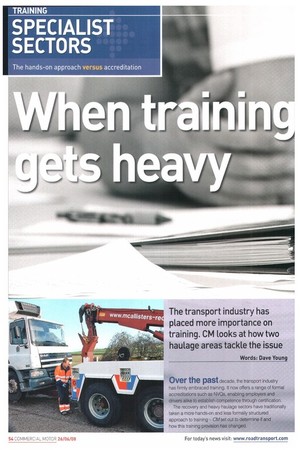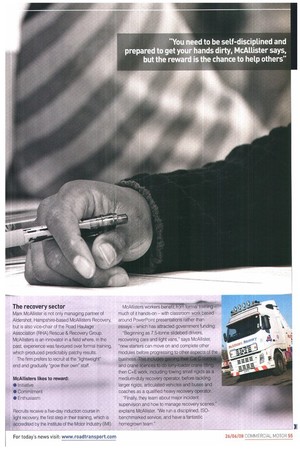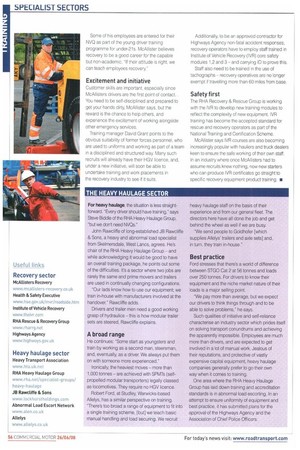SPECIALIST SECTORS
Page 54

Page 55

Page 56

If you've noticed an error in this article please click here to report it so we can fix it.
The hands-on approach versus accreditation
The transport industry has placed more importance on training. CM looks at how two haulage areas tackle the issue
Words: Dave Young Over the past decade, the transport industry has firmly embraced training. It now offers a range of formal accreditations such as NVQs, enabling employers and drivers alike to establish competence through certification. The recovery and heavy haulage sectors have traditionally taken a more hands-on and less formally structured approach to training — CM set out to determine if and how this training provision has changed.
The recovery sector
Mark McAllister is not only managing partner of Aldershot, Hampshire-based McAllisters Recovery, but is also vice-chair of the Road Haulage Association (RHA) Rescue & Recovery Group. McAllisters is an innovator in a field where, in the past, experience was favoured over formal training, which produced predictably patchy results.
The firm prefers to recruit at the "lightweight" end and gradually "grow their own" staff.
McAllisters likes to reward: • I n itJative • Commitment • Enthusiasm Recruits receive a five-day induction course in light recovery, the first step in their training, which is accredited by the Institute of the Motor Industry (IMO. McAllisters workers benett Tom formal training much of it hands-on with classroom work based around PowerPoint presentations rather than essays which has attracted government funding.
"Beginning as 7.5-tonne slidebed drivers, recovering cars and light vans," says McAllister, "new starters can move on and complete other
modules before progressing to o t business. and crane then C+E work, including towing small rigids as a medium-duty recovery operator, before tackling larger rigids, articulated vehicles and buses and coaches as a qualified heavy recovery operator.
"Finally, they learn about major incident supervision and how to manage recovery scenes," explains McAllister. We run a disciplined, ISObenchmarked service, and have a fantastic homegrown team." Some of his employees are entered for their NVCI as part of the young driver training programme for under-21s. McAllister believes recovery to be a good career for the capable Out non-academic. "If their attitude is right, we can teach employees recovery."
Excitement and initiative
Customer skills are important, especially since McAllisters drivers are the first point of contact.. You need to be self-disciplined and prepared to get your hands dirty, McAllister says, but the reward is the chance to help others, and experience the excitement of working alongside other emergency services.
Training manager David Grant points to the obvious suitability of former forces personnel, who are used to uniforms and working as part of a team in a disciplined and structured way. Many such recruits will already have their HGV licence, and, under a new initiative, will soon be able to undertake training and work placements in the recovery industry to see if it suits. Additionally, to be an approved contractor for Highways Agency non-fatal accident responses, recovery operators have to employ staff trained in Institute of Vehicle Recovery (IVR) core safety modules 1,2 and 3 and carrying ID to prove this.
Staff also need to be trained in the use of tachographs recovery operatives are no longer exempt if travelling more than 60 miles from base.
Safety first
The RHA Recovery & Rescue Group is working with the IVR to develop new training modules to reflect the complexity of new equipment. IVR training has become the accepted standard for rescue and recovery operators as part of the National Training and Certification Scheme.
McAllister says IVR courses are also becoming increasingly popular with hauliers and truck dealers keen to ensure the safe working of their own staff. In an industry where once McAllisters had to assume recruits knew nothing, now new starters who can produce IVR certificates go straight to specific recovery equipment product training. •








































































































































































